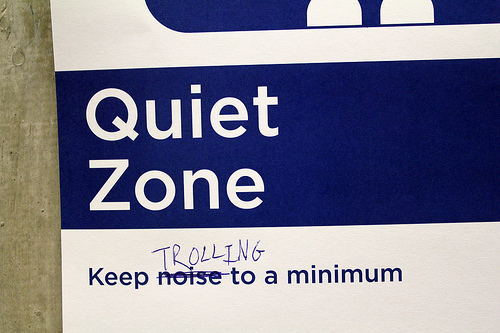The much-predicted First Nations “summer of discontent” has yet to materialize. Perhaps we could take advantage of this breathing space and do some fence mending on the frayed relationship between First Nation people and the rest of Canada. What better place to start then with the online comments section of every major media outlet in the country?
Whenever an article is posted on Idle No More, treaty rights or First Nation poverty, the comments section is quickly overwhelmed with abusive attacks. In cyber space the racists are loud, proud and determined to define the terms of discussion on First Nation issues.
Now I know that online commentary isn’t generally known for its erudite reflection. After all, troll culture seems to revel in trashing everyone. Thus, some might say, First Nation readers shouldn’t be so sensitive. But if you read through the comments it is impossible not to recognize a relentless pattern of malevolent attacks that would be considered inexcusable if they were used against other social, ethnic or religious minorities.
Let’s compare response to recent natural disasters. Online commentators responded to the natural disasters in places like Oklahoma, Bracebridge or Alberta with an outpouring of comments that were very heartfelt and moving.
And yet, when two communities in my region — Attawapiskat and Kashechewan — were hit by flash flooding earlier this spring, the pages were overwhelmed with vicious glee.
The online consensus was that the families who were flooded out by failed sewage lifts were actually responsible for the flood — either out of either deviousness or mental decrepitude.
“And so the annual spring shopping evacuation begins,” wrote one troll. “The only reason the problem never gets addressed is b/c it would take away the annual reason for evacuating south at government expense!”
“I guess the gasoline, drugs and alcohol made them stupid,” wrote another. “Talk about inept!!”
“I hope their cigarettes doesn’t get wet,” wrote one commentator. “Or their gasoline,” chirped in a second. “Or their oxycontin,” piled on a third.
The idea that government agencies might send aid to help these Canadian citizens sent the online commentators into a rage. “Their culture of dependency knows no bounds,” wrote one commentator in the HuffPost. Another suggested creating a separate currency for Aboriginal people so that white people could decide whether or not to honour the costs.
I used to think that trolls wrote this crap because they could post their junk anonymously. But now I seeing people who are not only willing to sign their name but supply an accompanying headshot. Far from feeling marginalized, the purveyors of these false stereotypes — the “lazy” Indian, the “corrupt” Chief, the “ripped off” taxpayer” — seems to be hijacking the public conversation away from issues like chronic infrastructure underfunding, third-class education and the inability to share in economic development.
Having received such little push back the trolls continue to promote even more dehumanizing caricatures. In a recent comment on Attawapiskat one person wrote, “Europeans have created the modern world, while you people created lice, fleas and more welfare recipients.” Such screeds were once found on marginal Neo-Nazi sites. They now find themselves at home on the public spaces provided by reputable media organizations.
So why the lack of action?
It’s not as if Canadians haven’t taken impressive steps to fight cyber bullying. And yet, whenever I hear about the wonderful efforts being taken to protect young people online I think of the trauma experienced by children in Attawapiskat by online attacks. When the media began reporting on their struggle to have a school built in the community, the online haters overwhelmed the comments pages. A teacher in Attawapiskat told me the children were very shaken up when they read the long string of abusive comments that demeaned them as “lazy Indians,” “losers”, “gasoline sniffers,” etc.
How is it that school boards, parents, police and editorialists rightly tell young people to speak up against the humiliation of individual youth online but don’t seem to notice when the hate is turned towards First Nation children?
Some Aboriginal friends have asked me if the silence from general society reflects a tacit support for such views? I certainly don’t believe this is the case, but clearly Canadians and the media need to do better.
The primary relationship in this nation remains the relationship between Canadians and the original people of Canada. For years it has been a dysfunctional and abusive relationship. I believe there is enormous goodwill to restore this relationship based on respect and understanding. There are amazing examples of this restoration happening all across the country. And yet, we need to do more to clean up the toxicity in cyberspace.
Canadians are among the most digitally literate societies in the world. The task before us isn’t just about challenging the stereotypes of First Nation people, but correcting the emerging and inaccurate image of the ugly Online Canadian. There is simply too much at stake to allow this relationship to be poisoned by trolls. So when you see examples of these hate comments please be Idle No More.
Photo: flickr/quinn.anya




